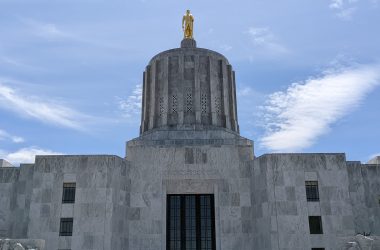 Photo: ODOT
Photo: ODOT
SALEM – The Oregon Transportation Commission named retired Oregon Department of Transportation (ODOT) Highway Division Administrator Paul Mather as ODOT Interim Deputy Director at a special meeting of the Commission in Salem.
His tenure began Monday, July 1.
The Oregon Transportation Commission is the governing board of the Oregon Department of Transportation (ODOT).
“It is an opportunity that is bittersweet,” said Commission Chair Tammy Baney. “It’s a time of transition when we must find someone who holds the trust and confidence of those at ODOT. Given the relationships Mr. Mather has with stakeholders and the Legislature – I have trust and confidence in his ability to move forward with the intentions of the OTC. He has a deep understanding of the projects in front of us. He is the right person at the right time.”
Mather’s resume is deep, with extensive time employed in various roles at ODOT, starting in 1984 when Mather first joined the agency as a traffic engineer in Portland.
With time spent in construction, maintenance and project development throughout the state, Mather climbed to hold a position as district manager, then Region Manager in 1993, then on to Highway Division Administrator from 2010-2018.
In addition to being licensed as a Professional Engineer, Mather holds a Bachelor’s degree in Civil Engineering from Oregon State University and a Master’s degree in Public Administration from Lewis and Clark College.
He’s expected to hold the role until no later than September of this year, when the Commission plans to appoint a new director by, pending approval of the Oregon Senate.
 ODOT maintains many local highways, including Highways 6, 26, and 47. Photo: Brenda Schaffer
ODOT maintains many local highways, including Highways 6, 26, and 47. Photo: Brenda Schaffer
Previous ODOT Director, Matthew Garrett, stepped down after 14 years in the role. His last day was June 30.
On June 20, 2019, the Commission named the agency’s Portland headquarters as the Matthew L. Garrett Building, memorializing a director that served through a sometimes tumultuous time for Oregon’s transportation infrastructure.
In a video released by ODOT to mark the occasion, Region 1 Public Information Officer Don Hamilton says, “Matt Garrett’s great legacy for ODOT was the standard he set for kindness and decency. I think naming this building after him is a reminder of that standard he set for all of us at ODOT.”
Garrett, who once served as an aide for the late Sen. Mark Hatfield (R-Ore.), controversially remained in his position as ODOT director following the state’s attempt to build a new Interstate-5 freeway and light-rail bridge at the highly-congested Columbia River crossing into Vancouver, Wash. in 2014.
That project fell apart during the planning stages even after $200 million of Oregon taxpayer funding was spent.
In his resignation letter to Governor Kate Brown and ODOT chair Tammy Baney, Garrett wrote that he worked at the 4,700-employee state agency for 22 years, the last 13 years as director, and noted he remained at his position through three governorships — Ted Kulongoski, John Kitzhaber, and Brown.
“I’m eager to take the next few months to explore the opportunity to do something new,” Garrett said in a prepared statement. “It was important to me to provide enough notice to allow time for a search to identify my replacement and provide a smooth transition to the new director.”
Many local government officials cheered the $5.3 billion transportation package that was signed into law in 2017 with Garrett as ODOT’s director, but still many others said the funding isn’t nearly enough to maintain and repair rural roadways throughout Oregon with a majority of the money going towards projects in Portland.
Gov. Brown, in a prepared statement, thanked Garrett for his time at ODOT.
“He has lead ODOT with distinction, guiding the agency through the implementation of an historic transportation package, and we will reap the benefits for decades to come,” she said. “I have deeply appreciated his thoughtful counsel and collaboration, and want to extend my gratitude for his service to our state.”
In Garrett’s resignation, he also pointed out three achievements he said he is proud to have accomplished: The 2017 transportation package, the creation of the Area Commissions on Transportation, which he said created “critical forums for statewide transportation planning,” and the creation of the first road-usage charge in the U.S.
Former two-term Metro President David Bragdon, in 2015 at an address to the City Club of Portland, shortly after the Columbia River crossing planning project failed, didn’t have such kind words for ODOT and Garrett.
Bragdon said there were many reasons for the lack of transportation funding at the city and state levels, and that ODOT would need to undergo systemic changes before its issues could be dealt with.
At that 2015 City Club of Portland meeting, BikePortland.org quoted Bragdon saying … “there definitely is a transportation governance and management problem, and that’s what needs to get fixed first. If it’s not fixed first, other problems will persist. If good people can’t make the system work, then you have to say, ‘There must be something wrong with the system.’”






